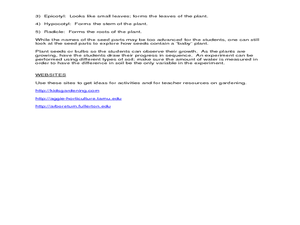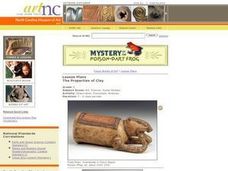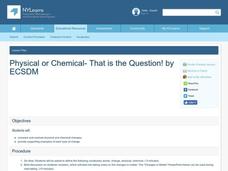Curated OER
Observations of Properties of Matter
To guide learners through observations of chemical samples in the lab, this resource asks them to give all formulas and complete the attached data sheet. There are multiple questions about categories of elements and general behavior,
American Chemical Society
Curious Crystals
Crystals are more than meets the eye! Can learners tell them apart simply by observation? As they examine five samples with a magnifier, they find that appearance alone is not enough. This serves as an introduction to a mini unit on...
Curated OER
Plate Tectonics Day 4 Earth's Interior Structure and Convection Currents
Students introduced to the interior structure of the Earth. They explore how the Earth's interior is broken down according to both it's physical properties and it's chemical composition. Students explore how convection currents within...
Curated OER
Matter and Change
Bright blue slides with yellow and white font make this presentation easy for learnerrs to read. The content is a brief overview of the commonly observed physical properties of matter, focusing on the differences among solids, liquids,...
Beyond Benign
Packed Up Properties
Determine physical properties of potential packaging materials. Continuing from previous lessons in the series, the resource asks groups to identify physical properties of the substances. They test for conductivity, solubility, water...
American Chemical Society
Using Color to See How Liquids Combine
Blue-tinted water is added to unknown liquids that have been tinted yellow to find out how they interact. This is a memorable activity that is part of an investigation on the properties of liquids, which is part of a unit on the...
Curated OER
Properties
In this properties activity, students classify each of the properties given as either extensive or intensive and as either physical or chemical. This activity has 1 graphic organizer and 8 fill in the blank questions.
Discovery Science Center
Kindergarten Observing, Comparing and Contrasting
Although this is a science lesson, it can be adapted to help meet Common Core standards in math as well. Starting scientists describe physical properties of objects and explore three forms of water. To address the Common Core, they can...
Curated OER
The Properties of Clay
Sixth graders determine the physical properties of clay by examining ceramic works of art. They evaluate local soil samples for suitability for sculpting and compare clay taken from soil to manufactured clay.
It's About Time
Chemistry and Physical Changes
Engage the class like never before as pupils learn to differentiate between multiple physical and chemical changes by conducting a list of small experiments, most often with household materials. They make observations and discuss the...
Teach Engineering
Rocks, Rocks, Rocks: Test, Identify Properties and Classify
Time is growing short. Teams work together to identify physical properties of rocks in order to determine the properties that would best suit their cavern shelter design.
American Chemical Society
Classifying Objects Based on their Observable Properties
Sorting objects by properties is a lesson in justification. Learners begin by studying different types of properties of materials, including those based on appearance and texture. They examine the properties of specific items and use...
It's About Time
Elements and Their Properties
How did ancient scientists classify elements? Answer this question and others as young chemists create a device to test the properties of various elements. They classify elements as metals or nonmetals, learn to differentiate between...
Curated OER
Physical or Chemical- That is the Question!
Students observe the differences between physical and chemical changes in properties. Through the use of an interactive presentation, the students compare and contrast the changes and provide supporting examples of each type of change.
American Chemical Society
Dissolving is a Property
Believe it or not, it is possible for liquids and solids to get along! A hands-on lesson has individuals explore dissolving properties of candies in water. They complete an activity guide to record observations about different candies...
Curated OER
Properties of Salt
Students discuss certain properties of salt and how it is used every day as well as harmful uses. They experiment with salt to see it conduct electricity, form crystals and water freezing temperature. They complete a worksheet to record...
PBS
Sink or Swim?
What's with all the numbers on plastic products? Learners complete an in-depth analysis of the physical properties of the different plastic types. They connect the properties of the plastics to uses and test their observation skills by...
California Institute of Technology
Physics of Light
Gummy bears are tasty, but did you know they are also used to determine color and light properties? Use the activity as a way to demonstrate light absorption, light reflection, and refraction with high schooler. Pupils conduct small...
Curated OER
Describing Another's Physical Features
Students practice describing someone using their physical characteristics and others try to select the person they are describing.
Curated OER
Changing Sugar
In this chemical and physical change worksheet, students use a sugar cube and observe its physical properties both when it is whole and after it is crushed. They heat the sugar cube and record 5 properties of the matter while being...
Curated OER
The Scientific Method Using Mystery Powders
Young scholars use the scientific method to determine physical and chemical properties of unknown substances. In this scientific method lesson plan, students discuss chemical and physical properties of substances as a class after a...
Curated OER
Making Cents of Density
Middle schoolers utilize their knowledge of the physical properties of matter such as mass, volume, and density to solve a problem. They utilize the scientific method to solve a problem. Pupils analyze their data to determine whether...
Curated OER
Evidence of Chemical Change
In this chemical change worksheet, students conduct 4 experiments set up around the room. They follow the instructions at each station for each experiment and list the physical properties and observe any changes at each station. Students...
Center for Learning in Action
Investigating Physical and Chemical Changes
Super scientists visit ten stations to predict, observe, and draw conclusions about the physical and chemical changes that occur when different states of matter—liquid, solid, and gas—are placed under a variety of conditions. To...

























